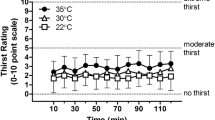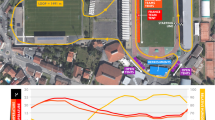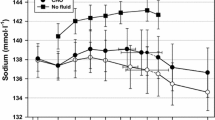Summary
The aim of the present study was to compare the influence of drinking water, a carbohydrate-electrolyte solution, containing additional free glucose (Glucose) or the same carbohydrate-electrolyte solution containing additional fructose (Fructose), on running performance. Twelve endurance-trained recreational runners volunteered to take part in this study; 9 completed the three and all 12 completed two trials. The subjects were randomly assigned to one of the three trials: Water, Glucose or Fructose. In each trial the subjects were required to run 30 km as fast as possible on a motorized treadmill, instrumented so that they could control its speed. The carbohydrate-electrolyte solutions contained a total of 50 g carbohydrate, 20 g as a glucose polymer. The Glucose solution contained an additional 20 g free glucose and the Fructose solution contained an additional 20 g fructose rather than glucose. The osmolality of the Glucose and Fructose solutions was approximately 300–320 mosmol and the energy equivalent of both solutions was 794 kJ·l−1. The subjects ingested 11 fluid throughout each run. The running times were not significantly different, being 129.3 (±17.7) min, 124.8 (±14.9) min and 125.9 (±17.9) min for Water, Glucose and Fructose respectively. There was a decrease (P<0.05) in running speed over the last 10 km of the Water trial from 4.14 (±0.55) to 3.75 (±0.86) m· s−1, which did not occur in the carbohydrate trials. Blood glucose concentrations during the Water trial decreased from 15 km onwards and at the end of the run they were significantly (P<0.05) lower than the value recorded at 15 km. In contrast they did not decrease in the two carbohydrate trials. There were no significant differences between the responses of the subjects during the Glucose and Fructose trials.
Similar content being viewed by others
References
Ahlborg B, Bergstrom J, Ekelund L-G, Hultman E (1967) Muscle glycogen and muscle electrolytes during prolonged physical exercise. Acta Physiol Scand 70:129–142
Bebb J, Brewer J, Patton A, Williams C (1984) Endurance running and the influence of diet on fluid intake. J Sports Sci 2:198 A
Bergstrom J, Hermansen L, Hultman E, Saltin B (1967) Diet, muscle glycogen and physical performance. Acta Physiol Scand 71:140–150
Bjorkman O, Sahlin K, Hagenfeldt L, Wahren J (1984) Influence of glucose and fructose ingestion on the capacity for long-term exercise in well-trained men. Clin Physiol 4:483–494
Bonen A, Malcolm SA, Kilgour RD, MacIntyre KP, Belcastro AN (1981) Glucose ingestion before and during intense exercise. J Appl Physiol 50:766–771
Brewer J, Williams C, Patton A (1988) The influence of high carbohydrate diets on endurance running performance. Eur J Appl Physiol 57:698–706
Callow M, Morton A, Guppy M (1986) Marathon fatigue: the role of plasma fatty acids, muscle glycogen and blood glucose. Eur J Appl Physiol 55:654–661
Chromy V, Gergel J, Voznicek J, Krombholzova L, Musil J (1977) Assay of serum free fatty acids by extraction, photometric method. Clin Chim Acta 43:317–320
Costill DL (1988) Carbohydrates for exercise: dietary demands for optimal performance. Int J Sports Med 9:1–18
Costill DL, Miller JM (1980) Nutrition for endurance sport, carbohydrate and fluid balance. Int J Sports Med 1:2–14
Costill DL, Coyle ED, Dalsky G, Evans W, Fink W, Hoopes D (1977) Effects of elevated plasma FFA and insulin on muscle glycogen usage during exercise. J Appl Physiol 43:695–699
Coggan AR, Coyle EF (1989) Metabolism and performance following carbohydrate ingestion late in exercise. Med Sci Sports Exerc 21:59–65
Coyle EF, Coggan AR (1984) Effectiveness of carbohydrate feeding in delaying fatigue during prolonged exercise. Sports Med 1:446–458
Coyle EF, Coggan AR, Hemmert ME, Ivy JJ (1986) Muscle glycogen utilization during prolonged strenuous exercise when fed carbohydrate. J Appl Physiol 61:165–172
Decombaz J, Sartori D, Arnaund M-J, Thelin A-L, Schurch P, Howald H (1985) Oxidation and metabolic effects of fructose and glucose ingested before exercise. Int J Sports Med 6:282–286
Dill DB, Costill DL (1974) Calculation of percentage changes in volumes of blood, plasma, and red cells in dehydration. J Appl Physiol 37:247–248
Farrell PA, Wilmore JH, Coyle EF, Billing JE, Costill DL (1979) Plasma lactate accumulation and distance running performance. Med Sci Sports 11:338–344
Fielding RA, Costill DL, Fink WJ, King DS, Kovaleski JE, Kirwan JP (1987) Effect of pre-exercise carbohydrate feeding on muscle glycogen use during exercise in well trained runners. Eur J Appl Physiol 56:225–229
Foster C, Costill DL, Fink WJ (1979) Effect of pre-exercise feeding on endurance performance. Med Sci Sports 11:1–5
Galbo H (1983) Hormonal and metabolic adaptations to exercise. Thieme, New York
Gleeson M, Maughan RJ, Greenhaff PL (1986) Comparison of the effects of pre-exercise feeding of glucose, glycerol and placebo on endurance and fuel homeostasis in man. Eur J Appl Physiol 55:645–653
Hargreaves M, Costill DL, Katz A, Fink WJ (1985) Effect of fructose ingestion on muscle glycogen usage during exercise. Med Sci Sports Exerc 17:360–363
Hargreaves M, Costill DL, Fink WJ, King DS, Fielding RA (1987) Effect of pre-exercise carbohydrate feedings on endurance cycling performance. Med Sci Sports Exerc 19:33–36
Hermansen L, Hultman E, Saltin B (1967) Muscle glycogen during prolonged severe exercise. Acta Physiol Scand 71:129–139
Hurley BF, Hagberg JM, Allen WK, Seals DR, Young JC, Cuddihee RW, Holloszy JO (1984) Effect of training on blood lactate levels during submaximal exercise. J Appl Physiol 56:1260–1264
Ivy JL, Miller W, Dover V, Goodyear LG, Sherman WM, Farrell S, Williams H (1983) Endurance improved by ingestion of a glucose polymer supplement. Med Sci Sports Exerc 15:466–471
Karlsson J, Saltin B (1971) Diet, muscle glycogen and endurance performance. J Appl Physiol 31:203–206
Kindermann W, Simon G, Keul J (1979) The significance of the aerobic-anaerobic transition for the determination of work load intensities during endurance training. Eur J Appl Physiol 42:25–34
Koivisto VA, Karonen S-L, Nikkila EA (1981 Carbohydrate ingestion before exercise: comparison of glucose, fructose and sweet placebo. J Appl Physiol 51:783–787
La Fontaine TP, Londree BR, Spath WK (1981) The maximal steady state versus selected running speeds. Med Sci Sports Exerc 13:190–192
Lamb DR, Brodowicz GR (1986) Optimal use of fluids of varying formulations to minimise exercise-induced disturbances in homeostasis. Sports Med 3:247–274
Laural S, Tibbling G (1966) An enzymatic fluorimetric micromethod for the determination of glycerol. Clin Chim Acta 13:317–316
Levine L, Evans WJ, Cadarett BS, Fisher EC, Bullen BA (1983) Fructose and glucose ingestion and muscle glycogen use during submaximal exercise. J Appl Physiol 55:1767–1771
Massicotte D, Peronnet F, Allah C, Hillaire-Marcel C, Ledoux M, Brisson G (1986) Metabolic response to (13C) glucose and (13C) fructose ingestion during exercise. J Appl Physiol 61:1180–1184
Maughan RJ (1982) A simple rapid method for the determination of glucose, lactate, pyruvate, alanine, 3-OH butyrate and acetoacetate on a single 20 μl blood sample. Clin Chim Acta 122:232–240
Maughan RJ, Fenn CE, Gleeson M, Leiper JB (1987) Metabolic and circulatory responses to the ingestion of glucose polymer and glucose/electrolyte solutions during exercise in men. Eur J Appl Physiol 56:356–362
Maughan RJ, Fenn CE, Leiper JB (1989) Effects of fluid, electrolyte and substrate ingestion on endurance capacity. Eur J Appl Physiol 58:481–485
McMurray RG, Wilson JR, Kitchell BS (1983) The effects of fructose and glucose on high intensity endurance performance. Res Q Exercise Sport 54:156–162
Mitchell JB, Costill DL, Houmard JA, Flynn MG, Fink WB, Beltz JW (1988) Effects of carbohydrate ingestion on gastric emptying and exercise performance. Med Sci Sports Exerc 20:110–115
Murray R, Eddy DE, Murray TE, Seifert JG, Paul GL, Halaby GA (1987) The effect of fluid and carbohydrate feedings during intermittent cycle exercise. Med Sci Sports Exerc 19:597–604
Okano G, Takeda H, Morita I, Katoh M, Mu Z, Miyake S (1988) Effect of preexercise fructose ingestion on endurance performance in fed men. Med Sci Sports Exerc 20:105–109
Paul AA, Southgate DAT (1978) McCance and Widdowson; the composition of foods. HMSO, London
Porte D, Williamson RH (1966) Inhibition of insulin release by norepinephrine in man. Science 152:1248–1250
Pruett EDR (1970) Glucose and insulin during prolonged work stress in men living on different diets. J Appl Physiol 28:199–208
Ramsbottom R, Williams C, Boobis LH, Freeman W (1989) Aerobic fitness and running performance of male and female recreational runners. J Sports Sci 7:9–20
Sherman WM, Costill DL, Fink WJ, Miller JM (1981) Effect of exercise and diet manipulation on muscle glycogen and its subsequent utilization during performance. Int J Sports Med 2:114–118
Sjodin B, Svedenhag J (1985) Applied physiology of marathon running. Sports Med 2:83–99
Taylor HR, Buskirk ER, Henschel A (1955) Maximum oxygen uptake as an objective measure of cardio-respiratory performance. J Appl Physiol 8:73–80
Wheeler KB, Banwell JB (1986) Intestinal water and electrolyte flux of glucose-polymer electrolyte solutions. Med Sci Sports Exerc 18:436–439
Williams C, Nute MGL (1983) Some physiological demands of a half marathon race an recreational runners. Br J Sports Med 17:152–161
Williams C, Brewer J, Patton A (1984) The metabolic challenge of the marathon. Br J Sports Med 18:245–252
Author information
Authors and Affiliations
Rights and permissions
About this article
Cite this article
Williams, C., Nute, M.G., Broadbank, L. et al. Influence of fluid intake on endurance running performance. Europ. J. Appl. Physiol. 60, 112–119 (1990). https://doi.org/10.1007/BF00846030
Accepted:
Issue Date:
DOI: https://doi.org/10.1007/BF00846030




